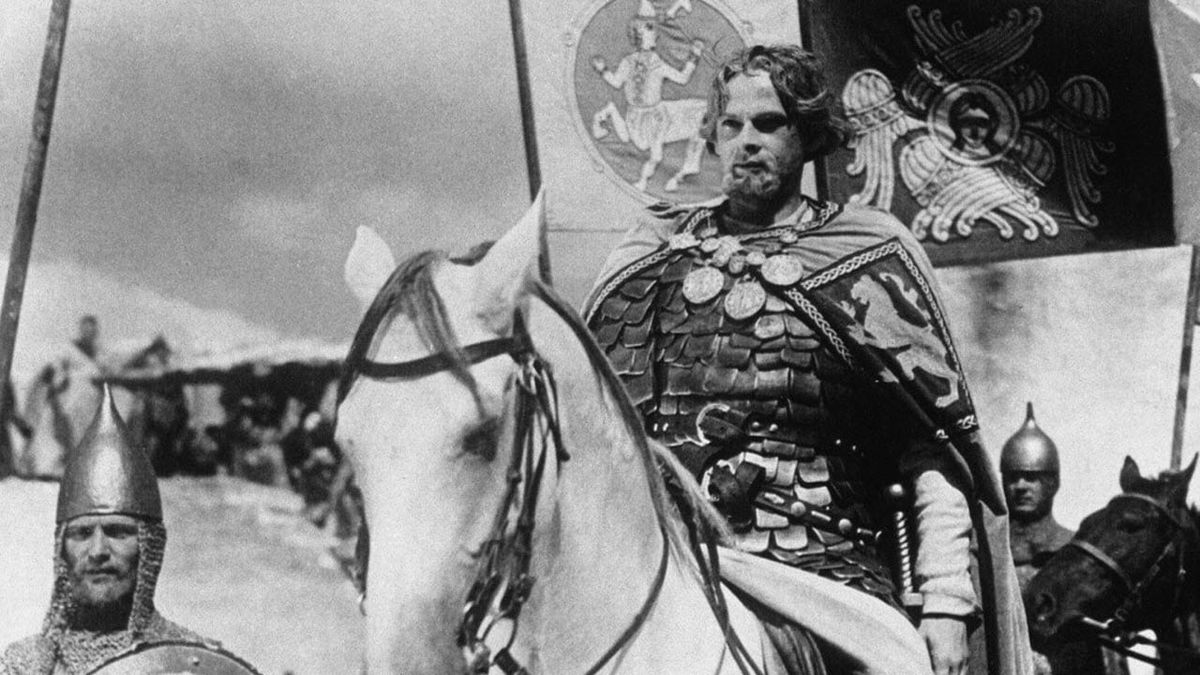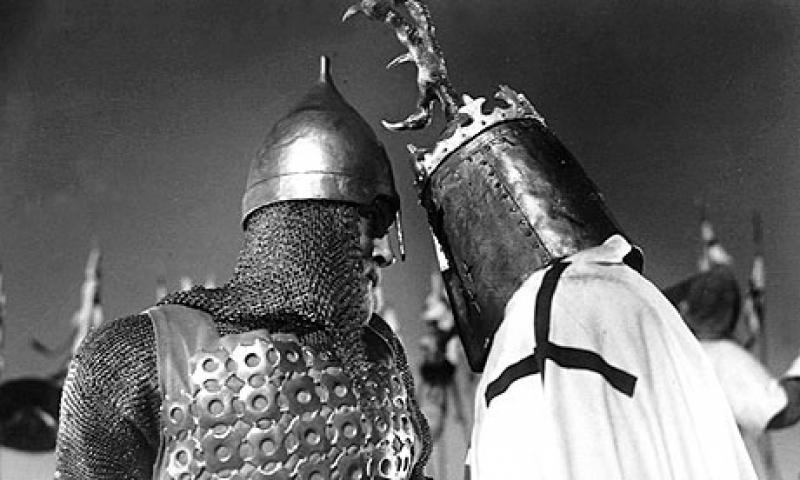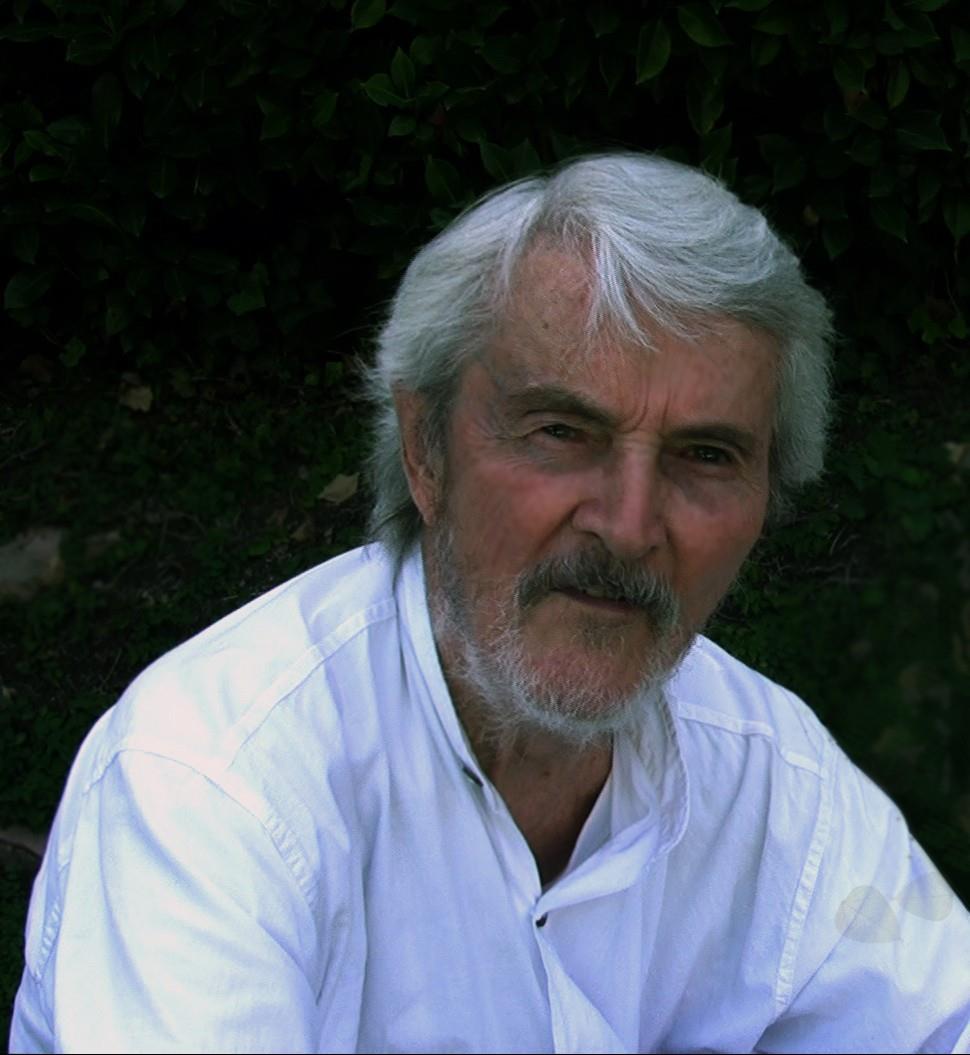
Alexander Yaroslavich Nevsky[1] 13 May 1221[2] – 14 November 1263), served as Prince of Novgorod (1236–40, 1241–56 and 1258–1259), Grand Prince of Kiev (1236–52) and Grand Prince of Vladimir (1252–63) during some of the most difficult times in Kievan Rus' history. He rose to legendary status on account of his military victories over German and Swedish invaders. (Still from iconic film Alexander Nevsky, 1938, which immortalised his victory over Catholic German and Danish knights (Livonian order) and Estonian infantry on Lake Peipus, on the Russo-Estonian frontier.)
THE RUSSIANS
Native land of enduring patience,
The land of the Russian people!
(Fyodor Tiutchev,(1803-1873), Romantic poet, second to Pushkin)
All things Russian have always seemed exotic, strange and incomprehensible to Westerners. Russians themselves have long debated the question as to who they are: Westerners or Asians? Or, are they something else? In any case, as reflected in current Russian foreign policy, the history of Russia is also inextricably bound up with Eurasia, the territory between Europe and Asia. Though of primary importance to Russia, the borders with Europe have always been far more rigid than those open borders with Asia itself. Asia for Russia remains an open space. That historical reality is of fundamental significance today in the dispute over Ukraine as well as in Russia’s recent about-face and its primary relations with Asia and the creation of an exchange currency that is no longer Western.
In the same light, again today, Western peoples, in general, are perplexed by the Russia-Ukraine question. What does it mean? Just who are these “ethnic Russians” living in Ukraine anyway? If they don’t like it there, shouldn’t they move to Russia?
Mike Whitney
produced an excellent interview with Russian President Putin’s advisor and friend, Sergei Glaziev (see appendix), under the title of “Understanding Ukraine in 15 minutes”. Well, that title appears to me as a journalistic exaggeration for the answers to these questions are complex and reach far back into the history of the Slavic peoples. Here I have sketched out some of the related problematics, offered a light historical background to the Slavic question, and taken a closer look at just who these Russians and Ukrainians really are.
The short answer is that they do not know themselves who they are. Russians wonder if Russia is an European country or whether she is not an extra-European country, westernized artificially and hastily by an elite of Peter the Great and to the detriment of her true values. Russian intellectuals too have long been puzzled by the problem. “Westernizers” in Russia saw the salvation of their country in a rapid assimilation of western culture; the so-called “Slavophiles” believed Russia could only be true to herself by maintaining and strengthening all that separated her from the West, by remaining loyal to her past values, and the development of a culture in opposition to the culture of the West. The struggle has gone on for eons, marked and distinguished by the Great Russian Revolution.
Today’s disputed country of Ukraine lies between Russia to its East and Poland to its West. One should keep in mind that Russians and Ukrainians, together with the Byelorussians of Byelorus just north of Ukraine, are historically one people, each however with its linguistic and cultural differences. For over three millennia these peoples, the Slavs, have inhabited parts of the enormous territory now known as Russia extending from the Black Sea eastwards across two continents nearly to Alaska, and from the North Pole to Persia in the South, an area bigger than the entire North American continent and one-sixth of the world’s land surface. Those peoples are known by the linguistic name of East Slavs. (The West Slavs are chiefly Poles and Czechs, the South Slavs Serbs, Croatians and Bulgarians).

Prince Alexander Nevsky (r) and his brother stand vigil the night before the great battle on the ice. against the Teutonic knights (Still from Alexander Nevsky, 1938).
However, as has been said, “geography may set the stage for history; men make history.” (Nicholas Riasanovsky, A History of Russia.) And what men made Russia’s history! Giants of men. Throughout the ages and across these great lands, hundreds of non-Slavic nationalities and cultures, European and Asian, Mongol and Persian, ancient Sumerians and the Iranian-speaking Asiatic Scythians from Central Asia have intermingled. Two of the most international rail stations in the world are Moscow’s Yaroslavsky and Kazansky stations serving hundreds of thousands of peoples from Europe to Asia.
Who are the Russians? you still ask. Telling, the answer of the great Russian poet, Alexander Blok, who wrote: “Yes, we are Scythians. Yes, we are Asiatics. With slanting and greedy eyes.”
My close friend, a Russian painter and originally an ethnic Russian from Kkarkov in today’s Ukraine, ( I find it difficult to write the Ukrainian Kharkiv) now for forty years in New York, has those slanting eyes, as do his two children, and to a minor degree, his grandchildren. Scythians, Russians, Ukrainians, Europeans, Americans? As much as my Russian-speaking friend tries to speak Ukrainian just to show off, I who do not know Ukrainian as such understand him perfectly. It’s like hearing English with a thick French accent.
Yet Russia shows that continuity is the real stuff of history. Events like the arrival of Christianity in Russia in the 9th century, the Mongol domination over Russian lands from the early 13th century to the late 15th, the Napoleonic invasion in 1812 and the burning of Moscow, World War I and II, and the Russian Revolution each brought about great change at enormous loss in Russian lives.
In the light of these confusing and historically tremendous occurrences, the thinking person is made aware that it is the relationship of the present with the past that makes a given present meaningful. Without continuity in the histories of Europe, in Russia, China, and also in America, each new generation would have to start over again and again, as, say, in a typical story invented by Jorge Borges. Myths, anecdotes and stories about the Mongol (Tatar) domination abound in Russian literature. The period extending from the Tatar invasion to the unification of Russia by the Moscow ruler Ivan III appears like a black hole in Russian history that historian D.S. Mirsky labels Russia’s “Dark Ages”. The saying ‘Scratch a Russian and find Tatar’ is valid, if only in those slanting eyes of my dear friend.
Here we are most interested in the so-called East Slavs, that is, those peoples who remained in their original territories north of the Black Sea after the Slavs split into three groups in the mid First millennium A.D., some moving south, others more westwards. The East Slavs speak the Eastern variety of the common Slavic. Russian speakers, the Great Russians, have always dominated the East Slavs. Their descendants remain today among those “ethnic Russians” in southeast Ukraine, in Crimea, the country of Moldova and the Transdnestr Republic, whom their brothers in Kiev, seduced by promises of gold from the West, want to expel or exterminate. And their language and culture are Russian.
It is an irony of history that the city of Kiev, today’s Ukrainian capital situated west of a more Asian Russia, was the first Russian state. Kiev, the city where the USA first ruthlessly overturned Ukraine’s legally elected Russian-friendly government and ignorantly installed a puppet government to rule over a phony state with the phony goal of becoming part of the European Union, A phony and impossible state in any case because Ukraine for Russia is like Texas or Midwestern states are to the United States. Russia would never surrender it totally to the West. Enough today for Moscow to turn off the oil spigots to re-establish the order the Slavs have always needed.

Alexander (l) and a Teuton knight take each other's measure (Alexander Nevsky, 1938). Stalin commissioned the film from S. Eisenstein as a morale builder in anticipation of a Nazi attack, which did materialise in 1941.
Mystery surrounds the establishment of the Kievan state. Its origins are connected with a tribe of people called “Rus”, from which the word Russian derives. Some historians claim the quarrelling Slavs called in Varangians (Swedes) to come and rule over their lands and create order out of chaos. According to many historians the Rus were one of those Varangian tribes; other theories link the Rus to Slavic tribes or people in northern lands or even in the south of Crimea and surrounding territories. Although the name Rus was previously unknown in the West, the name stuck. Rus became identified with the Kievan East Slavic-speaking state. In any case, the Rus formed a large group among them, most certainly Slavic, spoke a language that soon became Russian and established themselves from Kiev northwards to the heart of traditional Russian lands—like Novgorod, Vologda, Vladimir-Suzdal. And finally Moscow—which because of the city’s central position and because its great river, the Moskva, was a principle trade route—became the center of the future Russian empire.
I try not to stray from the subject of who these modern day Russians are but this minor and limited incursion into the complex story of the origins of Slavs and their state is necessary in order to know what we are talking about. Suffice it to say here that the Kievan state has the place in Russian history as does, say, the thirteen original colonies in the formation of the USA. An important and influential world capital in those times appears today as a second-class, boring puppet city-state controlled by a failing and waning US world power, a power with no concept of the significance of history.
As Kievan Russia—the future Russia itself—developed and expanded its borders ever farther eastwards, and became an important state, a new element was introduced into its culture: Christianity. By the early eleventh century, Kiev had become a new Christian civilization, a civilization that added “literary and artistic attainment to the political power and high economic development characteristic of the age.” (Riasanovsky)
Kiev’s rulers over pagan Russians first studied the major religions and according to legend decided against Islam—it forbade alcohol—because “drink is the joy of the Russian”—and against Judaism because it reflected beliefs of a defeated people without a state. Kievan Rus chose to become the Eastern version of Christendom, opening Russia to Byzantine culture and the Christian world at large, thus early on belying its reputation of a closed civilization. However, lest one forget, Christianity came to Russia from Byzantium, not from Rome. Since the break between the two churches the controversy between Roman Catholicism and Russian Orthodoxy remains today.
During the late Soviet period I, a journalist, had the good fortune to speak with Alexis II, the Metropolitan of the Russian Orthodox Church, at a historic meeting of eleven heads of the various Eastern churches held in Istanbul. To my question about attempts to mend the millennium-old separation of the Eastern and Western churches and of relations with the Vatican, Alexis said clearly: “We are after all Russians.”
With that background fixed in mind, we leap over centuries of wars and pestilence, the Tatar invasion, serfdom, to the last stages of Tsardom. Prior to the Russian Revolution, the ex-serfs were still linked in an economic vise to the land and large property owners from which they had been officially emancipated. While their desire for their own property plots drove the serfs, the Revolution itself opposed the very idea in the name of collectivization. Collectivization in agriculture was not one of the successes of the new Socialist state because the serfs of this traditionally agricultural land, resisted and wanted their own private plots of land. As a result of collectivization in agriculture, the number of families on the land diminished from 26,000,000 to 21,000,000 which meant that 5,000,000 abandoned the land, (Riasanovsky), some moving to urban areas, others to the Far East or elsewhere. In any case, the price was too high and was never really recovered, contrary to Socialist theory and expectations.
After centuries of silence, Kiev, as the capital city of the Ukrainian Soviet Socialist Republic, became an agricultural giant and regained some small part of its former luster. The Donbass (the Donetz-Basin) in East Ukraine became a major Soviet industrial center. Populated by “ethnic Russians”, it is today the region of the “rebels”, the “terrorists” in American political lingo, the Russian-Ukrainians who have separated from the Kiev puppet state and without which Kiev cannot survive economically.
Though Kiev was one of Soviet Russia’s most important cities, it was already sinking into provincialism. The second rate glory of THE Ukraine, the “bread basket” of former Soviet Russia, ended with the collapse of the Soviet Union. Especially since the Russian Revolution, the Ukraine has been one thing, Kiev another.
History itself opposes the dream of newfound Kievan glory instigated by the USA. That ahistorical dream is destined to boomerang against the rest of Europe itself. For Russia is present … ever present.
Talk about a battle between East and West for Ukraine’s soul is simply linguistic terminology, and at its worst political propaganda. An impossible quandary. Ukraine (the word means “borderlands”- like, say, New Mexico or Southern California in the USA. Ukraine is a geographical term. As such it has no soul. Only a handful of maverick, sold-out Ukrainians (Borderland Russians or Little Russians as they have long been called) can sell their souls. But not Ukraine itself which would be a contradiction of terms. As discussed above, Ukraine IS Russia. Its people are the original Russians. They are basically the same. Many Great Russians to the East do not recognize this as a historical-geographical-demographical reality. Borderlands have no fixed borders. In that sense it is farcical to even speak of Ukraine’s eastern borders. American imperialistic-military planners as well as West Europeans, do not, can not grasp the real Ukrainian story. How can Americans know when they do not even know exactly where Ukraine is and who its people are? Ukraine’s Nazis and Fascists who collaborated with the German Nazi invaders in WWII do not, can not reflect the real Ukraine.
Moscow responds to Western economic sanctions with counter-sanctions that already loom dramatic for economies of West Europe, especially the major economies of Germany, France, and Italy. Germany’s industrial exports to Russia amount to 36 billion Euros; and over 400,000 German workers are employed in companies exporting to Russia. The sanctions have cost Italy over $1 billion in lost exports, especially agricultural producers whose crops are already rotting in the fields. Big Italian energy companies, with major investments in Russia, face even bigger losses. With the sanctions Italy’s sick economy has lost any chance for recovery. Spanish farmers stand to lose 158 million Euros from the sanctions against their fresh fruit and nuts, or 22% of their total exports to non-EU countries; Greek farmers will lose 107 million Euros. Spanish meat exporters will lose 111 million Euros.
The West cuts industrial exports to Russia, Russia answers: no more Western automobiles to Russia; we’ll use our own; we’ll also eat our own cheese and drink our own beer. And they will. (I’ve drunk a lot of Russian beer and eaten a lot of Russian cheese and was perfectly satisfied.)
The question ordinary Europeans ask is: Why does Europe not rebel against America’s diktat? And that, dear readers, is a key question. It is true that Europe is in decline and that the future is Asia and elsewhere. Yet Europe is still Europe, the cultural home of many of us, and a continent-market of 450,000,000 persons, who export to and import from Russia. So what Europe does in this circumstance is not secondary.
At the same time many Russians want to be part—even if peripheral—of Europe. Even the old de Gaulle dream of a Europe extending from the Atlantic Ocean to Russia’s Ural Mountains and on to Vladivostok is no longer valid; a renaissance of the European idea and resumption of normal Russo-Europe relations has more economic-cultural-demographic sense than a Europe deprived of Russia and hanging onto America’s coattails.

 Gaither Stewart regularly writes at the intersection of history, fiction, and his own considerable experience as both writer and citizen of the world. This brings a poignancy to his writing, mixed with the very human struggles of self and relationship that frequently occur at historical crucibles such as WWII, the cold war, western imperialism in Mexico and South America or the contemporary military chess moves - as in his Europa Trilogy: The Trojan Spy, Lily Pad Roll, and Time of Exile. In Signs of the Time, the reader takes a journey with ordinary people who are each extraordinary in their own way. We see the world through their eyes. This is the gift of Stewart’s art and is amply demonstrated in his fine collection of short stories. Stewart is a former associate editor of The Greanville Post.
Gaither Stewart regularly writes at the intersection of history, fiction, and his own considerable experience as both writer and citizen of the world. This brings a poignancy to his writing, mixed with the very human struggles of self and relationship that frequently occur at historical crucibles such as WWII, the cold war, western imperialism in Mexico and South America or the contemporary military chess moves - as in his Europa Trilogy: The Trojan Spy, Lily Pad Roll, and Time of Exile. In Signs of the Time, the reader takes a journey with ordinary people who are each extraordinary in their own way. We see the world through their eyes. This is the gift of Stewart’s art and is amply demonstrated in his fine collection of short stories. Stewart is a former associate editor of The Greanville Post. 



